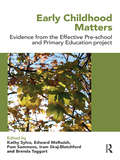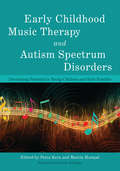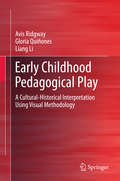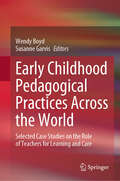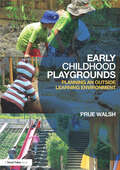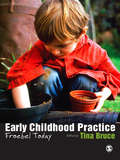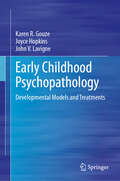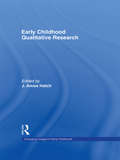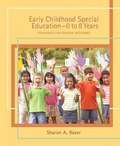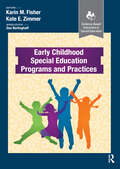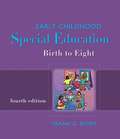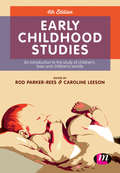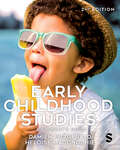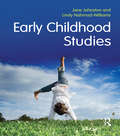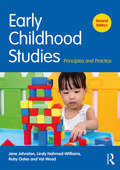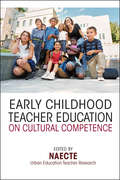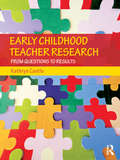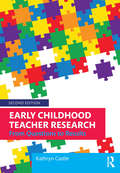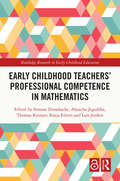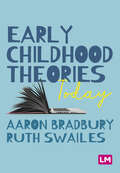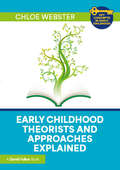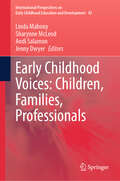- Table View
- List View
Early Childhood Matters: Evidence from the Effective Pre-school and Primary Education Project
by Iram Siraj-Blatchford Kathy Sylva Pam Sammons Edward Melhuish Brenda TaggartEarly Childhood Matters documents the rapid development of early years education and care from the late 1990s into the new millennium. It chronicles the unique contribution of the EPPE research to our understanding of the importance of pre-school. The Effective Pre-school and Primary Education (EPPE) project is the largest European study of the impact of early years education and care on children’s developmental outcomes. Through this ground-breaking project a team of internationally-recognised experts provide insights into how home learning environments interact with pre-school and primary school experiences to shape children’s progress. The findings of this fascinating project: provide new evidence of the importance of early childhood experiences show how these experiences influence children’s cognitive, social and behavioural development give new insights on the importance of early years education will be relevant to a wide audience who are interested in policy development, early years education and care, and ‘effectiveness’ research examine how the combined effects of pre-school, primary school and the family interact to shape children’s educational outcomes. This insightful book is essential reading for all those interested in innovative research methodology and policy development in early childhood education and care. It provides new evidence on good practice in early years settings and will have a wide appeal for students and those engaged in providing accredited courses of study at a range of levels in early childhood.
Early Childhood Music Therapy and Autism Spectrum Disorders
by Edited by Petra Kern Marcia HumpalThis comprehensive book includes an overview of recent developments in ASD and effective music therapy interventions based on ASD-specific approaches, instructional strategies and techniques for use in children's natural environments. Therapists wishing to conduct family-centered practice and to support parents integrate music into home routines will find a wealth of information, together with insights from music therapists who are parents of children with ASD. The book also looks at collaboration and consultation with interdisciplinary team members, including early childhood educators, speech-language pathologists and occupational therapists. Case scenarios, examples, checklists, charts, tip sheets, music scores, and online resources make this book accessible for everyone. Throughout the book's sixteen chapters, renowned experts share knowledge and practical applications that will give music therapists, students, professionals, educators, families and anyone interested in working with young children with ASD, a detailed understanding of the implementation and range of music therapy practices that can benefit these children and their families.
Early Childhood Pedagogical Play
by Avis Ridgway Gloria Quiñones Liang LiThis book re-theorizes the relationship between pedagogy and play. The authors suggest that pedagogical play is characterized by conceptual reciprocity (a pedagogical approach for supporting children's academic learning through joint play) and agentic imagination (a concept that when present in play, affords the child's motives and imagination a critical role in learning and development). These new concepts are brought to life using a cultural-historical approach to the analysis of play, supported in each chapter by visual narratives used as a research method for re-theorising play as a pedagogical activity. Whenever a cultural-historical approach is applied to understanding pedagogical play, the whole context of the playful event is always included. Further, the child's cultural environment is taken into account in order to better understand their play. Children from different countries play differently for many reasons, which may include their resources, local cultural beliefs about play and specific pedagogical practices. The inclusion and acknowledgement of social, cultural and historical contexts gives credence and value to understanding play from both child and adult perspectives, which the authors believe is important for the child's learning and development. As such, the relationships that children and adults have with human and non-human others, as well as any connections with artefacts and the material environment, are included in all considerations of pedagogical play.
Early Childhood Pedagogical Practices Across the World: Selected Case Studies on the Role of Teachers for Learning and Care
by Susanne Garvis Wendy BoydThis book explores pedagogical practices for early childhood education around the world in a collective of practices. The motivation for this book was to collect pedagogical practices from around the world to showcase the important work of early childhood teachers. Each country in this book shares unique features of their pedagogical work to show how they support young children’s learning and development, and work with families and communities. This intention also allows the documentation of innovative and exemplary practices to build a repertoire of pedagogy and understand cultural and contextual differences. Across the countries, this book explores routines, transitions, intentional teaching, shaping the environment, and other important aspects of learning and care. This book also provides opportunities for the development of commonality of practice, and to explore variations that exist around supporting young children’s learning and development.
Early Childhood Playgrounds: Planning an outside learning environment
by Prue WalshThe outdoor play environment has an integral role to play in a child’s learning across the pivotal early childhood years. An outside space that is well designed allows for enriching, stimulating and challenging play experiences that meet children’s ongoing developmental needs. Early Childhood Playgrounds provides a step-by-step guide to planning, designing and creating an outdoor learning environment for young children. Written by an experienced practitioner that has consulted on over 2000 early childhood settings and schools internationally, this book considers all aspects of the outdoor learning environment and provides practical support on: planning procedures and ideas for designs; a wide variety of play within a playground through the inclusion of quiet, open and active play areas; stimulating and challenging play; a natural environment that will provide interest and sustainability; spaces for toddlers and babies; playground needs for children with additional needs. This book will be fascinating reading for those studying early childhood and practitioners looking into the ways and means of setting up, improving or expanding their outdoor play facilities. It is also geared towards other disciplines, making it an essential guide for architects and planning professionals wanting to gain a greater understanding of play and the vital role it takes in meeting children’s needs and development.
Early Childhood Practice: Froebel today (Routledge International Handbooks Of Education Ser.)
by Tina BruceNursery World Awards 2012 winner! This stimulating book brings together contributions from distinguished practitioners, who demonstrate how they have used educational methods advocated by Froebel in contemporary settings. Stressing the importance of outdoor play, they explore the Froebelian principles of: - Play - Learning through firsthand experience - Parent partnership and community in early childhood - Practitioners supporting children's interests and learning - Finger rhymes and action songs - Movement - The garden and forests - Wooden blockplay - Use of clay, paint, junk modelling, construction kits The book emphasises how learning and the application of knowledge become possible through play. It contrasts the Froebel approach with the methods such as Montessori, Steiner and recent approaches to play such as post-Modern 'playfulness'. This book is relevant to undergraduate and postgraduate students of Early Childhood Education, as well as students following QTS and EYPS, PGCE, CPD and BEd courses. Tina Bruce CBE is an Honorary Visiting Professor in Early Childhood at the University of Roehampton.
Early Childhood Psychopathology: Developmental Models and Treatments
by Karen R. Gouze Joyce Hopkins John V. LavigneThis book examines psychosocial risk factors contributing to the development and maintenance of psychopathology in early childhood. It draws on developmental psychopathology theory and research to discuss different approaches to the classification of early childhood emotional and behavioral disorders, address the importance of multidomain approaches to understanding risk factors for specific diagnoses, and examine the movement toward transdiagnostic conceptualizations. The book describes how multidomain models of risk factors can be integrated with transdiagnostic approaches to illuminate the development of general psychopathology, internalizing and externalizing symptoms, and singular symptom clusters of the most common early childhood disorders, including oppositional disorders, ADHD, anxiety, and depression. In addition, the volume highlights the implications of this approach for clinical treatment, training of child clinicians, and the development of public policy. Key areas of coverage include: A developmental psychopathology approach to early childhood mental health disorders and the development of multi-domain models of risk factors. Risk factors contributing to the development and maintenance of emotional and behavioral symptoms in early childhood. Transdiagnostic approaches and risk factors for general psychopathology as well as specific types of symptoms. Current treatments for disorders in early childhood and a novel integrative approach to treatment based on research findings. Training of child clinicians and social policy implications derived from the research program detailed in the book. Early Childhood Psychopathology is an essential resource for researchers, clinicians, scientist-practitioners, and graduate students in such fields as developmental, clinical child, and school psychology, child and adolescent psychiatry, social work, family studies, early childhood education, and all related disciplines.
Early Childhood Qualitative Research (Changing Images of Early Childhood)
by J. Amos HatchHow can qualitative researchers make the case for the value of their work in a climate that emphasizes so-called "scientifically-based research?" What is the future of qualitative research when such approaches do not meet the narrow criteria being raised as the standard? In this timely collection, editor J. Amos Hatch and contributors argue that the best argument for the efficacy of qualitative studies in early childhood is the new generation of high quality qualitative work. This collection brings together studies and essays that represent the best work being done in early childhood qualitative studies, descriptions of a variety of research methods, and discussions of important issues related to doing early childhood qualitative research in the early 21st century. Taking a unique re-conceptualist point of view, the collection includes materials spanning the full range of early childhood settings and provides cutting edge views by leading educators of new methods and perspectives.
Early Childhood Special Education (0 to 8 Years): Strategies for Positive Outcomes
by Sharon A. RaverFeaturing the application of evidence-based strategies, ecological and family-based approaches, effective learning, and the use of responsive cultural/linguistic practices, Early Childhood Education (0-8 Years): Strategies for Positive Outcomes, prepares students for all the professional knowledge and skill competencies they need to promote optimal development in infant and toddlers (0-3), preschoolers (3-5), and primary-aged (6-8) children with special needs. Using real-life case studies to illustrate recommended practices, the book clearly presents disability characteristics, assessment practices, and easy-to-implement interventions for inclusive and special education settings, while giving students all the resources they need to master and apply the material. Highlights of This First Edition: Prepares students with ALL the professional knowledge and skill competencies necessary to promote optimal development in children with special needs from birth through 8 years old. Highlights intervention techniques from special education, speech-language pathology, occupational/physical therapy, and the fields of vision and hearing impairments. Uses a real-life case study in each chapter to illustrate recommended practices and strategies. Examines the legal, philosophical, and instructional tenets of the field of Early Childhood Special Education in detail, including IDEA 2004. Features how to use evidence-based practices and strategies that maximize communicative, cognitive/literacy, fine and gross motor, adaptive, and social-emotional development in infants and toddlers, preschoolers, and primary-aged children.
Early Childhood Special Education Programs and Practices (Evidence-Based Instruction in Special Education)
by Karin Fisher Kate ZimmerEarly Childhood Special Education Programs and Practices is a special education textbook that prepares pre- and in-service teachers with the knowledge, skills, and dispositions to deliver evidence-based instruction to promote positive academic and behavioral outcomes for young children (prekindergarten through second grade) with development delays and/or disabilities.Early Childhood Special Education Programs and Practices intertwines inclusive early childhood practices by using real-life anecdotes to illustrate evidence-based practices (EBPs) and procedures. The authors, experts in their fields, emphasize high-leverage practices, EBPs, and culturally sustaining pedagogy and align them with the practices, skills, and competencies recommended by the Council for Exceptional Children’s Division for Early Childhood. Families, administrators, and teacher educators of pre- and in-service early childhood special education and general early childhood education programs alike will find this book useful.Included in Early Childhood Special Education Programs and Practices are: An overview of early childhood and development of children ages 4 to 8 Strategies for relationship building with students, families, communities, and school personnel Tips on creating a caring and positive classroom environment Chapters devoted to evidence-based instruction in core subjects of reading and writing, mathematics, science, and social studies for students with disabilities in pre-K to second grade More than 80 images, photos, tables, graphs, and case studies to illustrate recommended Practices Also included with the text are online supplemental materials for faculty use in the classroom, consisting of an Instructor’s Manual and PowerPoint slides.Created with the needs of early childhood special educators in mind, Early Childhood Special Education Programs and Practices provides pre- and in-service teachers with the skills and practices they need to serve young children, their families, and communities across settings.
Early Childhood Special Education: Birth to Eight
by Frank G. BoweEarly Childhood Special Education: Birth to Eight is now available in the 4th edition. The 4th edition expands coverage of pre-academics and academics, responding to No Child Left Behind and IDEA 2004. The five key areas of development: communication, physical, cognitive, social/emotional, and adaptive, all include updated coverage. This is the only text on the market that addresses all of early childhood, age birth through eight, and all of early childhood special education. The text also takes into consideration that early childhood special education is a field driven by federal law, and contains complete coverage of those laws. Each chapter has opening questions, ending questions, and activities to help the student learn and retain the information. There is a full chapter devoted to research, and an online companion that serves to supplement the text and offers up to the minute content updates. The student will appreciate the outstanding readability of this updated, authoritative text.
Early Childhood Studies
by Rod Parker-Rees Caroline LeesonFor students of Early Childhood Studies, questions are as important as answers. What is childhood? Is childhood the same in all cultures? How do children grow and develop? What space do we make for children in our society? How do adults approach risk and what does this mean for children? Can children’s play be planned by adults? Early Childhood Studies tackles these questions and more. It explores the why, how and what of studying and working with young children and their families, considering how a range of theories can help us to identify useful questions. This is a comprehensive, up-to-date, challenging and accessible core text for the Early Childhood Studies course. Throughout, key theories and research findings are highlighted and explored to help link theory and practice. It covers the important themes of child development, communication, wellbeing, observation, working with parents, inclusive practice, leadership and research. This fourth edition has been fully updated throughout and includes new chapters on children and risk, inclusive learning environments, play and adults' concepts of childhood.
Early Childhood Studies: A Student′s Guide
by Damien Fitzgerald Heloise MaconochieThe second edition of this indispensable textbook supports your academic development as you explore key concepts, theories, and practices. Engaging case studies bring theory to life, encouraging you to apply your knowledge in real-world scenarios. Reflect on your own beliefs and values with thought-provoking reflection points, while actionable steps guide you in translating theory into practice. Stay current with an extensive list of further readings, ensuring you remain at the forefront of research and practice. Includes key features such as: Learning outcomes Action points Case studies Reflection points Spotlights on policy/research Chapter summaries Further readings Each chapter begins with Learning Outcomes and ends with a summary, to guide your studies and package the most complex of subjects in a digestible and understandable form. Unsure how Early Years policies are implemented and impact young children? Curious about working with multilingual children and families? This updated edition covers topics ranging from children′s neurological development, to the impact of technology and digital culture, to childhood disability and SEND. Complete and comprehensive, this is the only textbook that will support you from the moment your degree begins right up to your graduation. Whether you′re embarking on a career in early childhood or seeking a deeper understanding of this vital field, this book equips you with the essential knowledge and tools to make a positive impact in the lives of young children.
Early Childhood Studies: A Student′s Guide
by Damien Fitzgerald Heloise MaconochieThe second edition of this indispensable textbook supports your academic development as you explore key concepts, theories, and practices. Engaging case studies bring theory to life, encouraging you to apply your knowledge in real-world scenarios. Reflect on your own beliefs and values with thought-provoking reflection points, while actionable steps guide you in translating theory into practice. Stay current with an extensive list of further readings, ensuring you remain at the forefront of research and practice. Includes key features such as: Learning outcomes Action points Case studies Reflection points Spotlights on policy/research Chapter summaries Further readings Each chapter begins with Learning Outcomes and ends with a summary, to guide your studies and package the most complex of subjects in a digestible and understandable form. Unsure how Early Years policies are implemented and impact young children? Curious about working with multilingual children and families? This updated edition covers topics ranging from children′s neurological development, to the impact of technology and digital culture, to childhood disability and SEND. Complete and comprehensive, this is the only textbook that will support you from the moment your degree begins right up to your graduation. Whether you′re embarking on a career in early childhood or seeking a deeper understanding of this vital field, this book equips you with the essential knowledge and tools to make a positive impact in the lives of young children.
Early Childhood Studies: An Introduction To The Study Of Children's Worlds And Children's Lives
by Rod Parker-Rees Caroline LeesonThe third edition of this popular core text provides comprehensive and up to date coverage of the course content for Early Childhood Studies. The contents list reflects the multi-disciplinary and multi-professional scope of the discipline and provides an overview of current issues and approaches. Seven new chapters have been added including those on Frameworks for Understanding and Development, Providing an Enabling Environment and Action Research. Each chapter includes activities to help the reader engage with the text and advice on further reading.
Early Childhood Studies: Principles and Practice
by Jane Johnston Lindy Nahmad-WilliamsThis core introductory textbook offers an accessible yet rigorous approach to Early Childhood issues, addressing both Care and Education in the Early Years. It presents a multi-disciplinary perspective and will add value to any Early Childhood Studies course at both foundation and degree level. This text engages the reader by providing real-world examples that underpin theoretical perspectives and bring examples to life, whilst providing the student with an opportunity to reflect on their own similar experiences. The book is supported with a range of useful supplementary materials including an exciting companion website package.
Early Childhood Studies: Principles and Practice
by Ruby Oates Jane Johnston Lindy Nahmad-Williams Val WoodThis fully updated new edition offers a comprehensive, accessible, yet rigorous introduction to the study of Early Childhood that will will add value to any Early Childhood Studies course at both foundation and degree level. Addressing both care and education in the Early Years, the book considers a range of multi-disciplinary aspects of Early Childhood; including health, social, educational, psychological and sociological perspectives. Early Childhood Studies engages the reader by providing real-world examples that underpin theoretical perspectives and bring examples to life, while encouraging practitioners to engage in reflective practice by considering their own similar experiences. Key features include: Engaging activities and case studies that bring theory to life Cutting-edge research Practical tasks and advice with points for further reading End of chapter summaries, Reflective Tasks and Study Skills boxes in each chapter Full colour illustrations throughout This core introductory textbook is an indispensable resource for Early Years’ students and professionals, whatever their level of expertise or experience.
Early Childhood Teacher Education on Cultural Competence
by NAECTE Urban Education Teacher Research NetworkEarly Childhood Teacher Education on Cultural Competence discusses how early childhood preservice teachers can use teacher research to explore and gain cultural competence, enabling them to support students and families from diverse backgrounds. The book opens by describing the role of the university in preparing culturally competent teachers in urban settings and then explores historical perspectives of cultural competence. Chapters then move toward more practical perspectives of supporting families from racially diverse backgrounds, understanding diverse families, interprofessional education and collaboration, teacher resiliency, and social justice. Although the chapters focus on cultural competence in urban settings, they offer all early childhood teacher educators a challenge to address cultural competence in all settings.
Early Childhood Teacher Research: From Questions to Results
by Kathryn CastleWhat is early childhood teacher research and why is it important? How does a teacher researcher formulate a research question and a plan for doing research? How do teachers apply research results to effect change? Early Childhood Teacher Research is an exciting new resource that will address the sorts of questions and concerns that pre- and in-service teachers of young children frequently have when engaging in teacher research. Accessible and interactive, this book touches upon the important issues every early childhood teacher should know—the uniqueness of early childhood teacher research, reasons for doing it, and how to do it. In this comprehensive guide, Kathryn Castle explores each stage of teacher research, from conceptualization, generating research questions, identifying data sources, gathering and analyzing data, interpreting results, sharing results, to taking action based on results. Special features included in each chapter: Teacher Researcher Journal prompts for the reader to record ideas for research questions and to develop a plan for doing research. From the Field provides rich examples of real life early childhood teacher researchers and their perspectives on doing teacher research. Reflections ask readers to pause and think deeply about relating content to their own situations. Exploration of additional content, websites, resources, and activities are located in each chapter to help the reader go further in constructing their knowledge of teacher research.
Early Childhood Teacher Research: From Questions to Results
by Kathryn CastleIn this fully revised and updated second edition, Early Childhood Teacher Research addresses the questions and concerns that pre- and in-service teachers of young children frequently have when engaging in teacher research. Accessible and interactive, this book explores the important issues every early childhood teacher should know, guiding readers from conceptualization, generating research questions, identifying data sources, gathering and analyzing data, interpreting and sharing results, to taking action. This second edition features thoroughly updated references, standards, and resources, as well as all-new sections on teacher advocacy, social media and devices, data collection, and planned versus unplanned research. Each chapter features: Teacher Researcher Notebook prompts for the reader to record ideas for research questions and to develop a plan for doing research. “From the Field” vignettes providing rich examples of real-world early childhood teacher researchers and their perspectives on doing teacher research. Reflection prompts inviting readers to pause and think deeply about relating content to their own situations. Reflections can be recorded in the Teacher Researcher Notebook. Explorations of additional content, websites, resources, interviews, and activities.
Early Childhood Teachers‘ Professional Competence in Mathematics (Routledge Research in Early Childhood Education)
by Thomas Koinzer Katja Eilerts Simone Dunekacke Aljoscha Jegodtka Lars JenßenThis edited volume presents cutting-edge research on the professional competence of early childhood mathematics teachers. It considers professional knowledge, motivational-affective dispositions, skills and performance in early childhood mathematics and outlines future fields of research in this area. The book argues that it is essential for early childhood teachers to prepare a high-quality learning environment and that mathematical competence is highly relevant for children’s individual development. Bringing together research from mathematics education, educational science and psychology, it integrates international perspectives and considers the contextual factors that affect the development of children’s mathematical competence within Early Childhood Education and Care (ECEC) settings. The book uses a model to describe professional teacher competence that considers the dispositions of early childhood teachers, situation-specific skills of early childhood teachers and the performance of early childhood teachers. The book is the first of its kind to give a comprehensive overview and allows for integrative perspectives and interdisciplinary understanding regarding pre- and in-service ECEC teachers’ professional competence in the domain of mathematics. It will be essential reading for academics, researchers and students of early childhood education, mathematics education and teacher education.
Early Childhood Theories Today
by Aaron Bradbury Ruth SwaliesIf you work in the early years, you have probably heard of Montessori and Bronfenbrenner - but have you heard of Bavolek or Fisher? Contemporary theorists and theories of early childhood learning have much to teach us. It is often forgotten that this learning is still evolving and that new voices are joining the discussion every year. This book introduces early years practitioners to some contemporary theorists and explores their work alongside more well-known thinkers. It demonstrates how these theories relate to everyday practice in the early years and that discussion of them can support ongoing professional learning.
Early Childhood Theories Today
by Aaron Bradbury Ruth SwaliesIf you work in the early years, you have probably heard of Montessori and Bronfenbrenner - but have you heard of Bavolek or Fisher? Contemporary theorists and theories of early childhood learning have much to teach us. It is often forgotten that this learning is still evolving and that new voices are joining the discussion every year. This book introduces early years practitioners to some contemporary theorists and explores their work alongside more well-known thinkers. It demonstrates how these theories relate to everyday practice in the early years and that discussion of them can support ongoing professional learning.
Early Childhood Theorists and Approaches Explained (Key Concepts in Early Childhood)
by Chloe WebsterThis new book provides accessible explanations of the key theories, concepts, and approaches that form the foundations of early childhood education. Unpicking terms like "attachment," "constructivism," and "heuristic play" and introducing both established and less-known contemporary theorists, it is designed to be an easy and comprehensive guide to early childhood theories and approaches, an often complex topic to understand and explore fully.The book is divided into two parts. The first provides a brief overview of the theorists and approaches, both historical and modern, with explanations, backgrounds, benefits, and criticisms where appropriate. It also defines key terms used in theory and research alongside examples of how they work in practice. Part 2 looks more broadly at how these theories and approaches have been incorporated into settings and present-day policies. The chapters also offer insights from practitioners on how the theories are used successfully and how different countries and cultures adopt and implement particular approaches.This latest book in the Key Concepts in Early Childhood Series is essential reading for early years practitioners and students who want to support their studies and deepen their understanding, as it makes the pedagogical theories behind the early years curriculum and framework easy to understand and apply.
Early Childhood Voices: Children, Families, Professionals (International Perspectives on Early Childhood Education and Development #42)
by Andi Salamon Sharynne McLeod Linda Mahony Jenny DwyerThis revolutionary book explores theoretical and practical issues of listening to children, families, and professionals who advocate for and work with young children to promote social justice and improve their lives, and to ensure no one is left behind. Listening to children is explored across multiple disciplines internationally and highlights the practical application of the United Nations Sustainable Development Goals in the context of the Convention on the Rights of the Child. The work explores innovations, theories, and partnerships, and draws on the voices of children, families, early childhood educators, speech-language pathologists, and multidisciplinary teams from across 17 countries to provide a shared vision for equity, peace and justice for all while integrating social environmental, economic, and dimensions of sustainability. Topics include giving children a voice; methods for listening to and documenting young children’s perspectives; listening to and working in partnership with families, educators, and professionals; and wellness and wellbeing of young children and their families across multiple dimensions.
